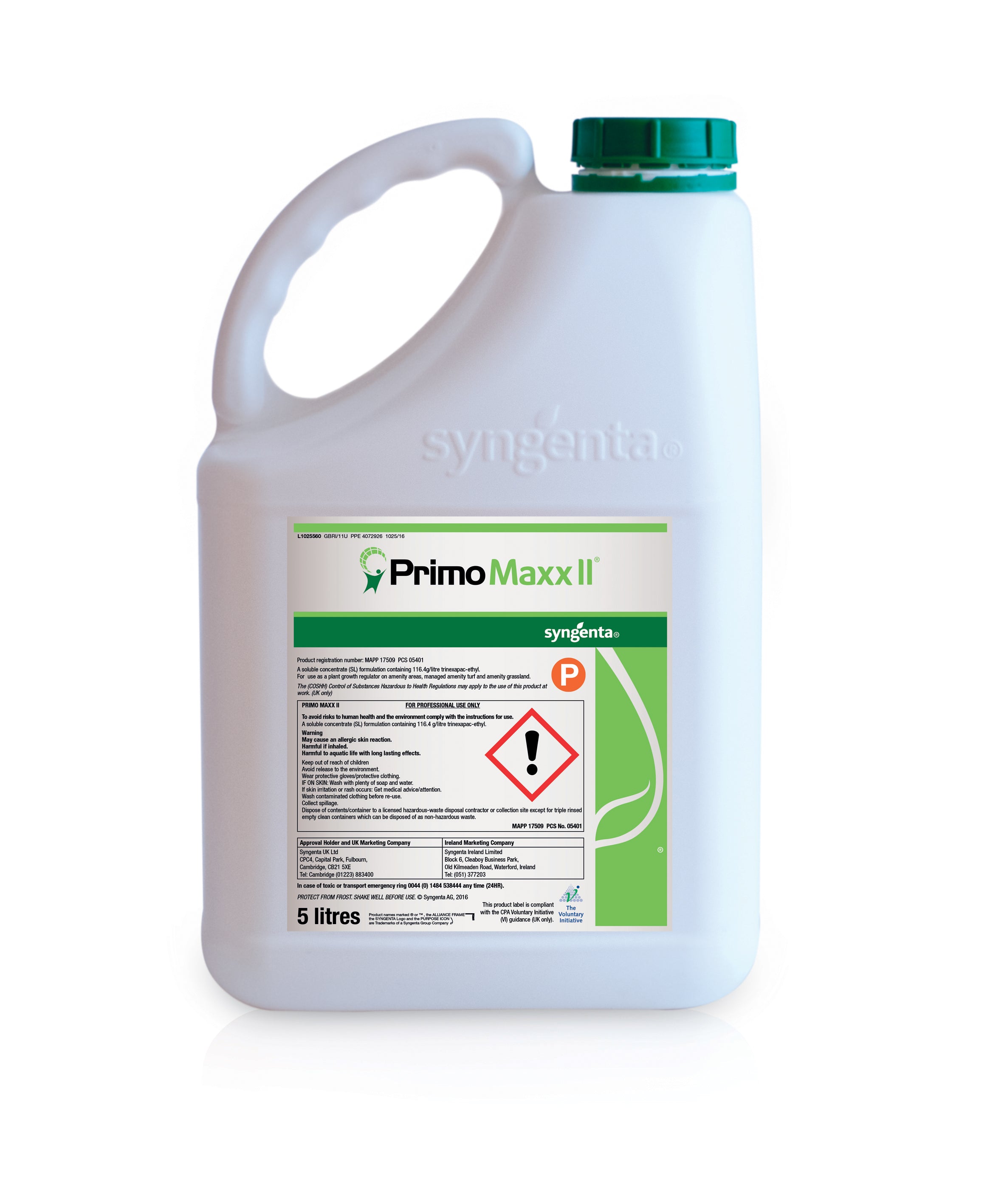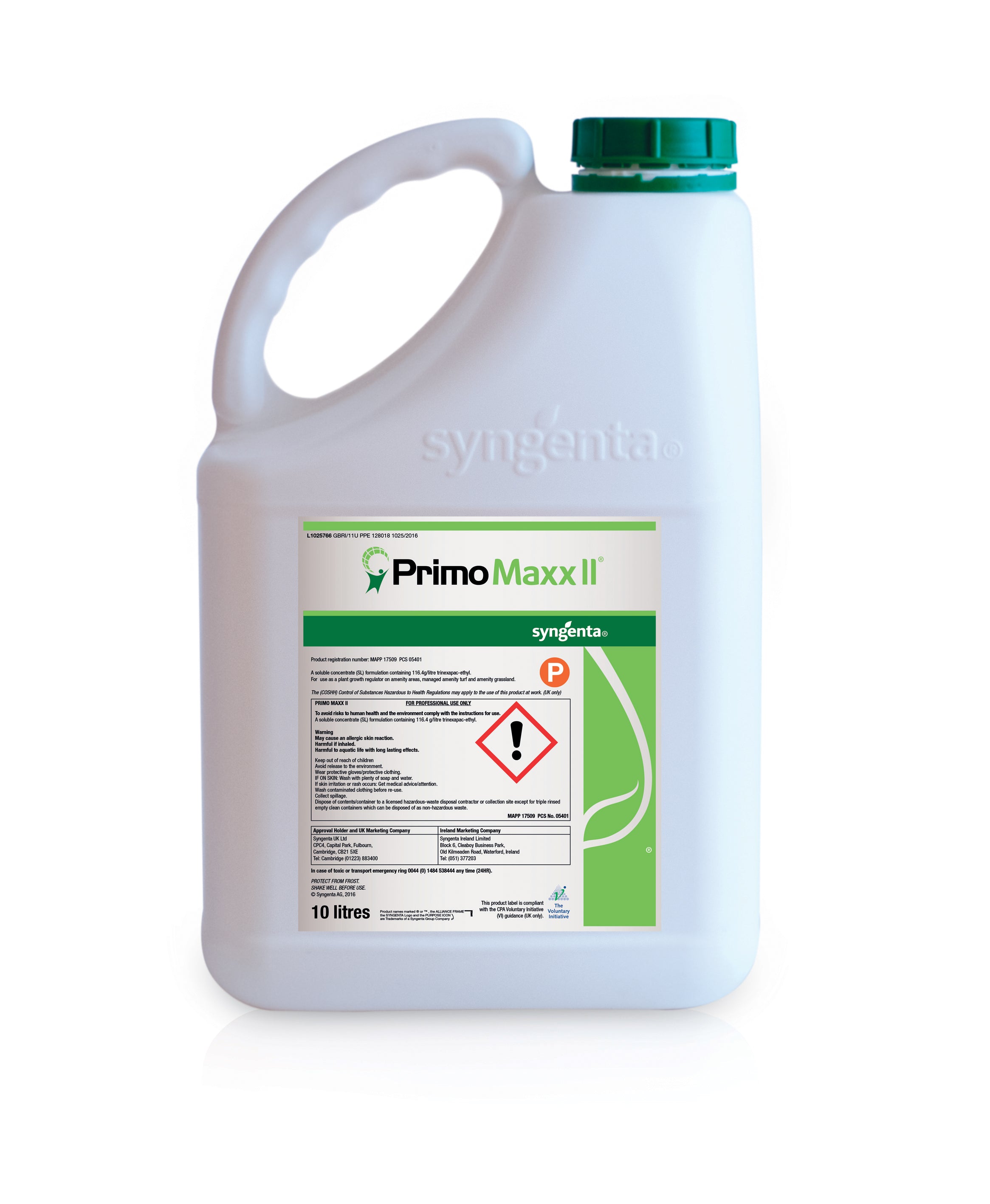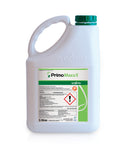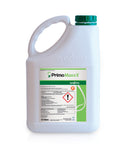Description
Primo Maxx II Growth Regulator - MAPP no. 17509
Active Ingredients: 116.4 g/l trinexapac-ethyl
Changes in a co-formulant ingredient mean that products with the previous MAPP no. 14780 was available for sale until the 30th April 2017 with a use-up period expiring on the 30th April 2018. The new MAPP no. 17509 has replaced this product.
Bulk Requirement?
Please contact us on 01902 440280 for a quote.
Not only does Primo Maxx II inhibit vertical growth, but actually diverts plant growth downward into the root system to produce increased food reserves and lateral stem development. This in turn produces a thicker, healthier sward that better equips your turf to withstand temperature extremes, moisture loss, traffic and wear and tear, and even helps in the management of Poa annua.
Primo MAXX II can be used on all well maintained quality turf grass areas such as golf course fairways, golf tees, greens and surrounds. It can also be used to help manage areas which are difficult to mow such as sloping banks or turf edges by flower beds and pavements.
- Easy to use liquid formulation.
- Reduces grass top growth.
- Flexible application rates for all turf surfaces.
- Improves turf colour and appearance.
- Cuts down mowing frequency - one application can reduce grass clippings by up to 50%.
- Cuts down wear and tear on machinery.
Pack Coverage: Variable
The purchaser and/or end users are responsible for ensuring that these products are used in line with industry Approved Codes of Practice. All operators must be trained and certificated in using and applying any Ministry Approved professional product.


Typical Fairway and Tee Programme
Apply at 4 - 6 week intervals. Commence applications when the turf is actively growing
| Application 1 | Application 2 | Subsequent Applications | |
|---|---|---|---|
| Primo Maxx II | 0.4 - 0.8 l/ha | 0.8 - 1.2 l/ha | 0.8 - 1.2 l/ha |
| Minimum nitrogen input per application (N) | 2.5 kg/ha | 2.5 kg/ha | 2.5 kg/ha |
| Application Volume (l/ha) | 250 - 400 | 250 - 400 | 250 - 400 |
For fairway/semi-rough and greens programmes, consider amending granular fertiliser rates to take account of additional foliar applied nutrient. Apply through to October to build carbohydrate reserves and improved over-winter disease tolerance. A maximum rate of 2.4 l/ha can be used on rye-grass fairways or tees, and 1.6 l/ha on compositions of Poa, bent grass and Fescue fairways and tees.
Typical Greens Programme
Apply at 14 - 28 day intervals as appropriate. Commence applications when the turf is actively growing
| Application 1 | Application 2 | Subsequent Applications | |
|---|---|---|---|
| Primo Maxx II | 0.2 l/ha | 0.2 - 0.4 l/ha | 0.2 - 0.4 l/ha |
| Minimum nitrogen input per application (N) | 2.5 kg/ha | 2.5 kg/ha | 2.5 kg/ha |
| Application Volume (l/ha) | 250 - 400 | 250 - 400 | 250 - 400 |
Rough and Semi Rough Programme
Apply at 4 - 6 week intervals as appropriate. To aid management of peaks of rough growth
| Application 1 | Application 2 | Subsequent Applications | |
|---|---|---|---|
| Primo Maxx II | 0.6 - 0.8 l/ha | 1.2 - 1.6 l/ha | 1.2 - 1.6 l/ha |
| Minimum nitrogen input per application (N) | 2.5 kg/ha | 2.5 kg/ha | 2.5 kg/ha |
| Application Volume (l/ha) | 250 - 400 | 250 - 400 | 250 - 400 |

A maximum rate of 3.2 l/ha can be used in rye-grass roughs and 2.4 l/ha on compositions of meadow grass, Fescue and bent grass roughs.
Note: The above are provided as typical Primo Maxx II programmes, by Syngenta, but rates and timings should be adapted to local conditions as appropriate. Research trials and recommendations in this brochure include results of work using Primo Maxx and Primo Maxx II.
Use plant protection products safely. Always read the label and product information before use.
PRIMO MAXX II may be applied with knapsack sprayers, hand sprayers, boom sprayers and spray-gun application devices.
For further information regarding Primo Maxx II, contact our technical sales team on 01902 440280.
Technical Information
Product Label (5L)
SKU - 164200
Safety Data Sheet (5L)
SKU - 164200
Product Brochure (5L)
SKU - 164200
Delivery and Returns
Delivery charge (if applicable) applied at checkout. Next working day delivery is available on some products, as an option on orders placed before 1pm - excludes festive season & bank holidays. Please note deliveries to Highlands, Cornwall and more remote areas may take longer. Surcharges apply for non mainland locations, call for more information - More delivery information.
We require deliveries to be signed for. If no one is available to sign for your delivery, you may request it is left in a safe place by leaving a signed note for the driver, requesting the item is left without a signature. Please note that this is left at your own risk and at the driver's discretion.
For large orders, please be aware that if you require a smaller 7.5 tonne lorry, the maximum weight for pallets is 750 kg - otherwise the standard pallet size limit of 1000 kg applies.
Please note for deliveries that require a pallet, the pallet/packaging itself is the customer's responsibility and will not be uplifted or taken upon delivery.
If you have any access restrictions for lorries or large vehicles please speak to our sales team on +44 (0)1902 440250.
Collection from our Telford, Shropshire, Trade Counter is available for this product - More collections information.
Safe use of pesticides
The purchaser and/or end users are responsible for ensuring that these products are used in line with industry Approved Codes of Practice. All operators must be trained and certificated in using and applying any Ministry Approved professional product.
Please be aware that by proceeding you are purchasing a professional pesticide product.
You must ensure the end user of these products complies with the DEFRA/HSE Code for the Safe use of Pesticides:
"By law, everyone who uses pesticides professionally must have received adequate training in using pesticides safely and be skilled in the job they are carrying out."








